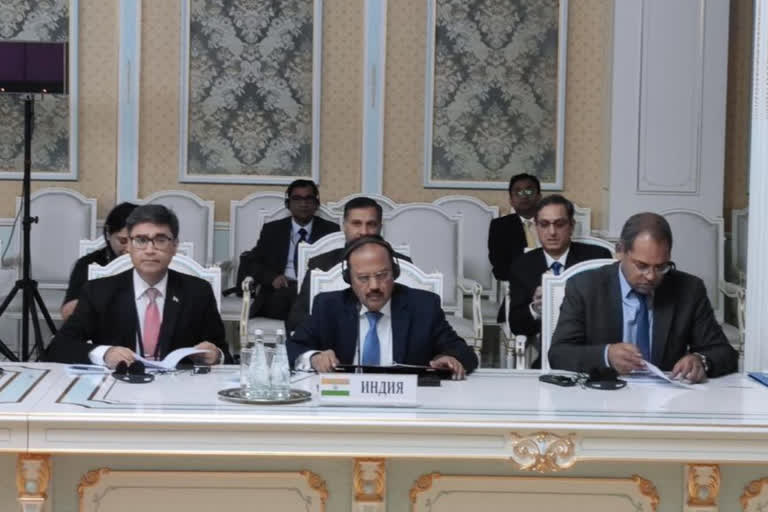New Delhi: Tajikistan's capital Dushanbe is once again up in arms against terror groups that are operating in Afghanistan. It is the same nation that provided an intelligence base for anti-Taliban forces in the late 90’s. Now the Taliban is again at the helm after US forces withdrew from the country, Tajikistan is willing to provide a space against the forces that are a potential threat to regional security. Nations like China, Iran, India, and four Central Asian countries are worried about the growing influence of terror groups operating freely under the nose of the Taliban. To find a way to reduce the security threat posed by the international terror groups, Dushanbe hosted a second NSA level dialogue a week ago in which India’s NSA Ajit Doval participated along with the representatives of Russia, China, Iran, Uzbekistan, Kyrgyzstan, Turkmenistan, and Kazakhstan.
The security concerns that were being discussed seem to have gone intense, particularly for India, after the Monitoring Team of the Taliban Sanctions Committee of the United Nations submitted its report to the United Nations Security Council revealing the activities of JeM and LeT- the India specific groups -operating in Kashmir. Both JeM and LeT, according to the report, have their training camps in Afghanistan which are likely to get their cadres infiltrated into Jammu and Kashmir.
National Security Advisor, Ajit Doval shared the concerns during the regional security dialogue on Afghanistan on how the war torn Afghanistan may pose threat to regional security if the scenario analysis is not considered for immediate redressal of the issues.
The dialogue between the nations concerning Afghanistan renewed the common objectives among the coalition of seven nations aimed at reducing the security threat that the Taliban-ruled country is likely to pose to the nations in the neighborhood. To arrest the security threat well in advance the dialogue seems significant, particularly in the context of a change of guard in Pakistan.
It is pertinent to mention that both China and Pakistan refused to participate in the last NSA level dialogue hosted by India in November last year. Imran Khan-led former Pakistan government would share patron-protege relations with the Taliban had made PLA unconcerned about the security issues related to the Xinjiang Muslims because of the promises the former Pakistan army had made to prevent any possible threat from the radical groups. China appeared nonchalant regarding the activities of The East Turkestan Islamic Movement (ETIM) an anti-China organization that operates from Afghanistan. Imran is now out of power and his close proximity with commanders of the Taliban will in no way benefit China in containing pro-Uyghur forces that are supported by groups operating in Afghanistan.
The beleaguered former Prime Minister of Pakistan holds no position to aid China with ‘perception management’ support against alienated Muslims of Xinjiang province and now China is left with no option but to join the amalgam of nations, believing they face a common threat from Afghanistan. The same is true about Iran which borders Afghanistan where Hazara-dominated provinces fear for their security. Recent attacks carried out by radical groups targeting Hazara Shia Muslims in Afghanistan is a major concern for Iran.
Considering Dushanbe dialogue a potential remedy to the growing threats, Iran chose Tajikistan as its first foreign destination having a manufacturing line to make military drones named as Ababil-2. Ababil is a bird mentioned in the Quran as a savior of the faithful. Ababil will be capable of targeting the enemy positions and will keep eye on their movement as well.
Owing to their allegiance with the US and with Iran’s revolutionary guards, Hazara Muslims are under tremendous threat. Recent attacks in Afghanistan are witness to the fact that a number of casualties of Hazaras in Mazar e Sharief and elsewhere make it obligatory for Iran to have a balance of power in the region. Like Iran, Tajikistan is also under a perennial risk for the position it had taken for people like Ahmad Shah Masood (Slain Anti Taliban commander) and Amrullah Saleh two decades ago. It was the first country in the neighbourhood that provided an intelligence base for Saleh and commander Masood. The commander was later killed by the Taliban men disguising as journalists in 2001. Saleh is again fighting the Taliban with Masood’s son from Panshir valley waiting for major support from countries like India and the US.
In the absence of Pakistan’s support to the Taliban, India and its allies find it a viable and opportune time to bring inclusive leadership to Afghanistan. The new government in Pakistan is no more interested in taking the Indian government head-on but rather trying to come closer to India which Imran has, in fact, alleged a day before in his speech.
The time is ripe for India to initiate a diplomatic offensive against radical forces which are inimical to peace. For India to have at least a neutral relationship with China to do away with hostilities, the dialogue for regional peace may bear some fruits as spoilers are busy restoring their lost glory. The collective wisdom should prevail to end the hostilities which seems to come to pass soon if the coalition partners continue to meet think and act jointly.



